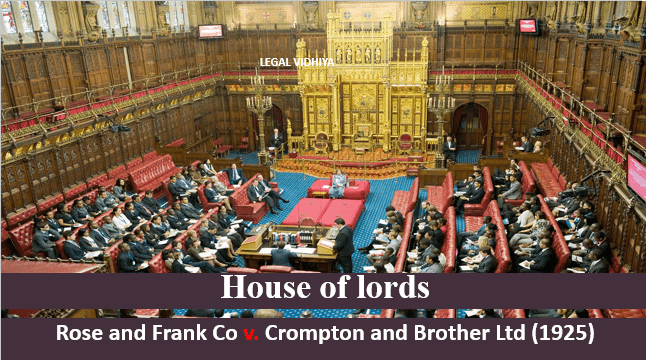
| Court | House of Lords |
| Date of Judgment | 5 December, 1924 |
| Plaintiff | Rose and Frank co. |
| Defendant | J R Crompton and Bros Ltd |
| Judges | Earl of Birkenhead, Lord Atkinson, Lord sumner, Lord Phillimore, Lord Buckmaster |
| Citation | (1925) AC 445; (1924) 20L1 L Rep 249 |
FACTS OF THE CASE:
- Rose and Frank were an American company and Crompton and Bros Ltd were a British company. The Plaintiffs were the sole US distributor of JR Crompton’s carbon paper product.
- The parties entered into an agreement for sale of paper goods in the USA. The agreement between the parties to the contract provided that :-
“That arrangement is not entered into ……. as a formal or legal agreement ,and shall not be subject to legal jurisdiction in the law courts…….that it will be carried through by the parties with mutual loyalty and friendly co- operation.
- The plaintiff placed orders for the papers and the British company (Defendant) accepted the order. Before the orders were fulfilled, the defendant terminated the agreement and refused to send the paper.
- The plaintiff sued the defendant for breach of contract.
ISSUE RAISED :
- Whether the agreement of 1913 constituted a legally binding contract?
- Whether the orders constituted enforceable contracts of sale?
ARGUMENTS:
Defendant’s Arguments:
- J R Crompton and Bros company argued that the contract was not legally enforceable, as it included a clause stating that it (agreement) was not legally binding.
Plaintiff’s Arguments:
- The defendant has committed breach of contract because the defendant refused to send the product.
JUDGEMENT:
- Firstly, as to the 1913 agreement, the Court gave overriding weight to the provision in the agreement that expressly provides that it is to be solely an “honourable pledge”, as demonstrating that the parties did not intend the arrangement as a legally-binding contract. The Court explained that the argument that clauses restricting the legal enforceability of a contract apply solely when the document is otherwise unquestionably of legal force. In this case, the document and circumstances did not intend to create any legal interest, and the clause expressly precluding the agreement’s legal enforceability applies. Secondly, the Court held that the fact that the arrangement does not constitute a legal contract does not preclude the orders and acceptances from constituting legally-binding contracts. The lack of enforceability of an express legal arrangement under an agency agreement does not preclude the legal transactions. The orders constituted mutual offers and acceptances with each transaction having ordinary legal significance.
CONCLUSION:
- The case of ROSE AND FRANK CO. , V. J R CROMPTON AND BROS. LTD has had a lasting impact on contract law, both in england and around the world. The case helped to clarify the circumstances under which an agreement can be considered a contract, what types of terms are necessary for a contract to be enforceable.
- In this case it was held that the contract was not legally enforceable, as it contained a clause stating that it was not intended to create legal relations. The court held that the clause was clear and unambiguous, and that it reflected the intentions of the parties. As such, the contract was not legally enforceable, and Rose and Frank Co’s claim was dismissed.
REFERENCE:
Written by Preeti an intern under legal vdihiya.




0 Comments